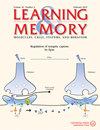Remembering what we imagine: the role of event schemas in shaping how imagined autobiographical events are recalled
IF 1.8
4区 医学
Q4 NEUROSCIENCES
引用次数: 0
Abstract
Much like recalling autobiographical memories, constructing imagined autobiographical events depends on episodic memory processes. The ability to imagine events contributes to several future-oriented behaviors (e.g., decision-making, problem solving), which relies, in part, on the ability to remember the imagined events. A factor affecting the memorability of such events is their adherence to event schemas—conceptualizations of how events generally unfold. In the current study, we examined how two aspects of event schemas—event expectancy and familiarity—affect the ability to recall imagined events. Participants first imagined and described in detail autobiographical events that either aligned with or deviated from an event, expected to occur in a context (e.g., a kitchen) that was either familiar or unfamiliar. This resulted in imaginations ranging from maximally schema-congruent (expected events in a familiar context) to maximally novel (unexpected events in an unfamiliar context). Twenty-four hours later, participants recalled these imagined events. Recollections were scored for the number of reinstated details from the imaginations and the number of newly added details. We found greater reinstatement of details for both the maximally congruent and maximally novel events, while maximally novel events were recalled more precisely than other events (i.e., fewer added details). Our results indicate a complementary benefit to remembering schematic and novel imagined events, which may guide equally important but distinct future-oriented behaviors.记住我们的想象:事件图式在塑造如何回忆想象的自传体事件中的作用
与回忆自传体记忆一样,构建想象的自传体事件也依赖于外显记忆过程。想象事件的能力有助于若干面向未来的行为(如决策、解决问题),而这些行为部分依赖于记忆想象事件的能力。影响这些事件可记性的一个因素是它们是否符合事件图式--对事件一般如何发展的概念化。在本研究中,我们考察了事件图式的两个方面--事件预期和熟悉程度--如何影响回忆想象事件的能力。被试首先想象并详细描述了自传体事件,这些事件或与事件一致,或与事件相背离,预计将发生在熟悉或不熟悉的环境中(如厨房)。这导致了从最大限度的图式一致(熟悉环境中的预期事件)到最大限度的新颖(陌生环境中的意外事件)的想象。24 小时后,参与者回忆这些想象事件。对回忆中恢复的想象细节数量和新添加的细节数量进行评分。我们发现,最大程度一致的事件和最大程度新颖的事件都能恢复更多的细节,而最大程度新颖的事件比其他事件的回忆更精确(即增加的细节更少)。我们的研究结果表明,记忆图式事件和新颖的想象事件有互补的好处,这可能会引导同样重要但又不同的面向未来的行为。
本文章由计算机程序翻译,如有差异,请以英文原文为准。
求助全文
约1分钟内获得全文
求助全文
来源期刊

Learning & memory
医学-神经科学
CiteScore
3.60
自引率
5.00%
发文量
45
审稿时长
6-12 weeks
期刊介绍:
The neurobiology of learning and memory is entering a new interdisciplinary era. Advances in neuropsychology have identified regions of brain tissue that are critical for certain types of function. Electrophysiological techniques have revealed behavioral correlates of neuronal activity. Studies of synaptic plasticity suggest that some mechanisms of memory formation may resemble those of neural development. And molecular approaches have identified genes with patterns of expression that influence behavior. It is clear that future progress depends on interdisciplinary investigations. The current literature of learning and memory is large but fragmented. Until now, there has been no single journal devoted to this area of study and no dominant journal that demands attention by serious workers in the area, regardless of specialty. Learning & Memory provides a forum for these investigations in the form of research papers and review articles.
 求助内容:
求助内容: 应助结果提醒方式:
应助结果提醒方式:


